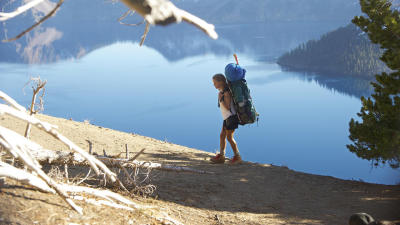Wild is director Jean-Marc Vallee’s follow-up to Dallas Buyers’ Club and it is as powerful and rewarding an experience.
In wild, Reese Witherspoon stars as Cheryl Strayed whose hike up the Pacific Crest Trail (PCT) was a response to a personal tragedy that came after her descent into drugs and sex – which followed another tragedy. Witherspoon is blessed with a terrific script, by Nick Hornby (An Education), and the inspiration of the woman who lived these experiences and wrote the memoir from which the film was adapted.
Although starting a story in the middle can be a terrible idea, Wild opens with Strayed losing a toenail and one of her hiking boots right off the bat – the hurling the other boot away with an anguished scream. Although I haven’t read the book, I am told that’s how the book begins and, in this case, it works for the movie because we are immediately drawn into this woman’s plight and wondering how she came to be there.
As the movie continues, we learn about her relationship with her mother, Bobbi (Laura Dern) and brother, Leif (William Nelson, then Keene McRae) – and how they fled her abusive husband. As the film cuts between pivotal events in Strayed’s life – her mother’s diagnosis of late stage cancer; her descent into drugs and sex leading to the disintegration of her marriage, to a decent guy named Paul (Thomas Sadowski (The Newsroom); her unplanned pregnancy, and setting out on this 1,000-mile hike – we slowly get to know her and, for a large part of the movie, she’s not a particularly sympathetic character.
Witherspoon’s body of work in film definitely makes a difference in keeping us involved as Strayed works some stuff out in her life. As she hikes the PCT, she encounters other hiker hikers – one, a fellow named Greg (Kevin Rankin, Gracepoint, Justified), helps her begin to adjust to hiking by just being a nice guy who offers her a cooked meal (among her many errors in the beginning, she got the wrong type of fuel for her camp stove). They agree to meet up at Kennedy Falls and go their separate ways.
Strayed’s journey is as metaphysical as it is physical. She’s trying to process her past and figure out who she is – as well as grieving for her mother, her marriage, and other things. She goes from hopelessly incompetent (watching her try to set up her tent is one of the funniest sequences in the film) to more or less capable, while facing dangers human and otherwise.
A key to her journey is learning to understand her mother, who once told her that she didn’t regret any of the mistakes she’d made in life – including her abusive husband – because they’d led to her having her children.
Thus, Strayed is not only grieving, she’s coming to terms with who she might be instead of who she has been. Her journey is of self-discovery as much as anything else. As she learns to handle the problems she faces on her hike, she evolves from the person who made those horrible mistakes into the person who takes charge of her life – who acts instead of reacts.
That none of this seems trite or stereotypical comes, in part, from the fact that this is much what happened in the real Cheryl Strayed’s life – and, in part, because Witherspoon hides nothing (quite literally – for most of film she wears no makeup and, in some crucial scenes of debauchery, no clothes) in the portrayal of Strayed’s story. Her willingness to show where Strayed went – for better or worse – makes her performance a courageous one – especially since, as she’s said in interviews, Strayed was there for much of the shoot (she even has a cameo in the film).
Vallee has taken Hornby’s script and created a balance between Strayed’s physical and metaphysical journeys – by reflecting one in the other, as Strayed did in her book, he gives us a story of a woman who tried, failed, grieved, fell and got back up as a reinvented person who has become free through accepting who she was and moving forward into who she wanted to be.
Wild could have been trite, but is, instead, inspiring.
Final Grade: A+
Photo courtesy of Fox Searchlight
